Class X /Chapter - 3 "Two Stories about Flying"
Two Stories about Flying
1. His First Flight by Liam O’ Flaherty
2. Black Aeroplane by Frederick Forsyth
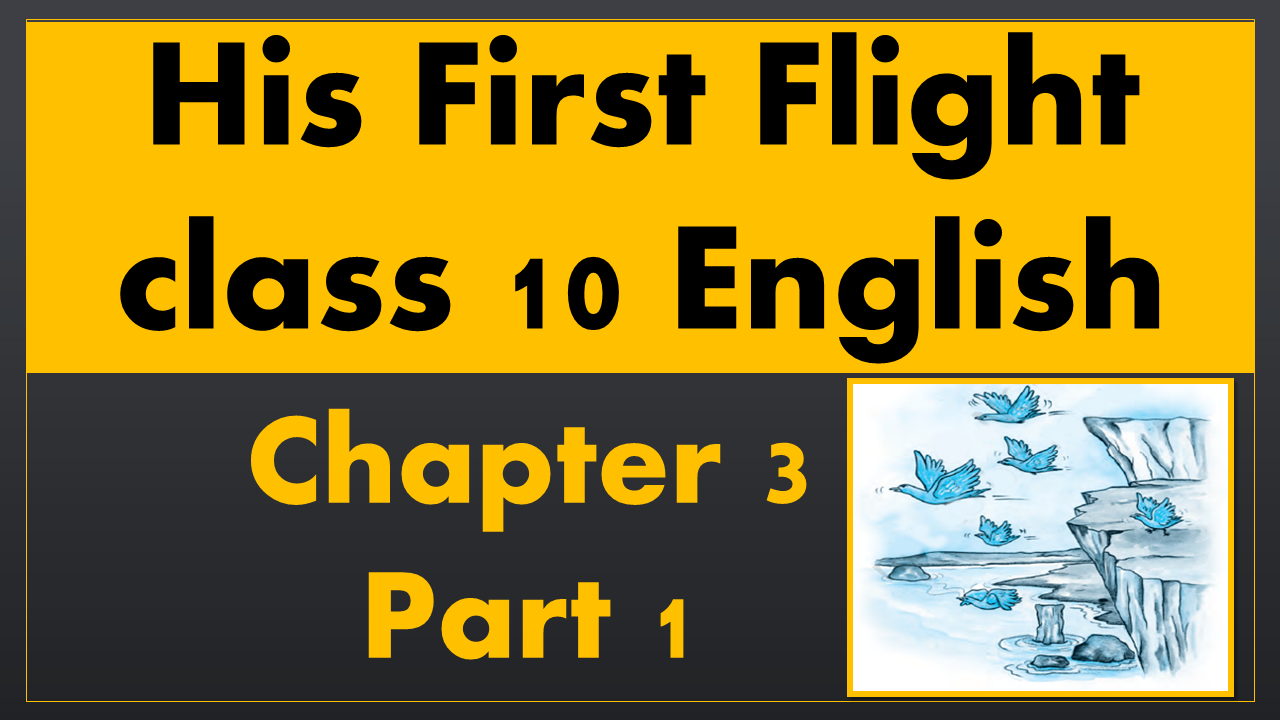
“The journey of a thousand miles begins with a single step”
1. His First Flight by Liam O’ Flaherty
His First Flight – Introduction
The story by “Liam O’ Flaherty” is an account of a young bird that is afraid to fly for the first time. He believes that his wings would not support him. Despite his younger siblings flying fearlessly with much shorter wings, he could not gather the courage to do the same. He was punished to stay hungry if he did not try. Thus, it was his mother that compelled him to fly by using food as a trap. The lesson reflects how one hesitates to take the first step and that fear is all in the mind. One should trust one’s abilities because “the fear of suffering is worse than the suffering itself”.
About the Characters
Story I-His First Flight
Family of Seagulls -6 members in the family of seagulls
Young Seagull- One who is unable to fly due to fear.
Story I-His First Flight
Family of Seagulls -6 members in the family of seagulls
Young Seagull- One who is unable to fly due to fear.
His First Flight Summary
The story “His First Flight” by “Liam O’ Flaherty” is about a young seagull who is afraid to fly. All his younger siblings despite their much shorter wings flew fearlessly while he could not gather the courage to trust his own wings. The young seagull became sad when he saw his parents perfecting his younger siblings in the art of flying. His parents scold and taunt him for not even trying. They even call him a “coward”. They tell him a lot to at least try and also threaten him to leave him alone and hungry if he does not. The following day, he is left in isolation and upon feeling hungry; he tries to seek the attention of his family members. Only his mother, who is withering a fish in an attempt to eat it, notices his son. The young seagull cries out of starvation hoping his mother would help. On seeing his mother come to him with the fish, he gets excited. But on noticing that his mother stopped mid-way, he gets maddened out of hunger and takes a dive at the fish, forgetting for a moment that he is afraid to fly. Finally, he took his first flight. All the family members celebrate his victory by cheering and dancing around him. He also attempts at floating in the sea that he was once afraid of. Thus, he overcomes his fear and realises that it is all in the mind.
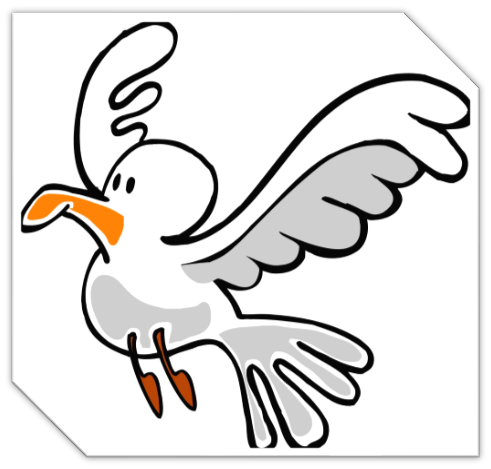
Explanation
THE young seagull was alone on his ledge. His two brothers and his sister had already flown away the day before. He had been afraid to fly with them. Somehow when he had taken a little run forward to the brink of the ledge and attempted to flap his wings he became afraid. The great expanse of sea stretched down beneath, and it was such a long way down — miles down. He felt certain that his wings would never support him; so he bent his head and ran away back to the little hole under the ledge where he slept at night.
Seagull- a bird that lives near the sea and has short legs, long wings, and white and grey feathers
Ledge- a narrow horizontal shelf projecting from a wall (or here) a cliff
Brink- the extreme edge of land before a steep slope or a body or water
Expanse- a wide continuous area of something
Ledge- a narrow horizontal shelf projecting from a wall (or here) a cliff
Brink- the extreme edge of land before a steep slope or a body or water
Expanse- a wide continuous area of something
The story is about a young seagull who is at that stage of life where he has to learn to fly. Unlike his younger brothers and sisters, he is too afraid to fly. When all of them went for flying for the first time near the edge of the sea, all of them except him, succeeded. He could not trust his wings. He got terrified by the vast sea and got convinced that he could never fly. As a result, he was ashamed and disheartened and thus, went inside the ledge where usually he slept.

Even when each of his brothers and his little sister, whose wings were far shorter than his own, ran to the brink, flapped their wings, and flew away, he failed to muster up courage to take that plunge which appeared to him so desperate. His father and mother had come around calling to him shrilly, upbraiding him, threatening to let him starve on his ledge unless he flew away. But for the life of him he could not move.
Flapped- (of a bird) move (its wings) up and down when flying or preparing to fly
Muster- gather
Plunge- jump or dive
Shrilly- with a high pitched and piercing voice or sound
Upbraiding- scold
Muster- gather
Plunge- jump or dive
Shrilly- with a high pitched and piercing voice or sound
Upbraiding- scold
His younger siblings managed to take their first flight despite their wings being shorter than his, but he could not summon the courage though he tried so desperately. He was scolded by his parents for not trying again but he was so afraid, that he could not even move.
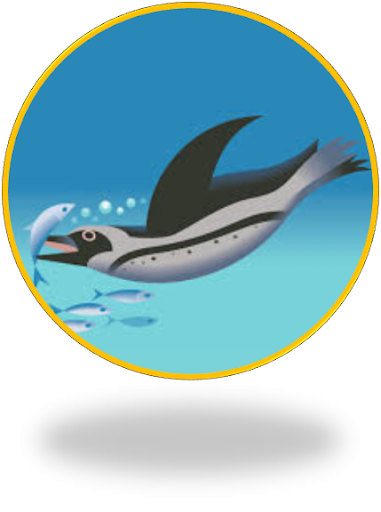
That was twenty-four hours ago. Since then nobody had come near him. The day before, all day long, he had watched his parents flying about with his brothers and sister, perfecting them in the art of flight, teaching them how to skim the waves and how to dive for fish. He had, in fact, seen his older brother catch his first herring and devour it, standing on a rock, while his parents circled around raising a proud cackle. And all the morning the whole family had walked about on the big plateau midway down the opposite cliff taunting him with his cowardice.
Herring- a soft-finned sea fish
Devour- eat quickly
Cackle- laugh in a loud, harsh way
Cowardice- lack of bravery
Devour- eat quickly
Cackle- laugh in a loud, harsh way
Cowardice- lack of bravery
Now, he had been alone for a day after he tried because his parents were busy focussing on his siblings. They helped his siblings master the art of flying and diving for food (fish). His older sibling even caught his first fish which he proudly ate at a rock while his parents celebrated it. That morning, his parents taunted him all the way for being a coward.
The sun was now ascending the sky, blazing on his ledge that faced the south. He felt the heat because he had not eaten since the previous nightfall. He stepped slowly out to the brink of the ledge, and standing on one leg with the other leg hidden under his wing, he closed one eye, then the other, and pretended to be falling asleep. Still they took no notice of him. He saw his two brothers and his sister lying on the plateau dozing with their heads sunk into their necks. His father was preening the feathers on his white back. Only his mother was looking at him. She was standing on a little high hump on the plateau, her white breast thrust forward. Now and again, she tore at a piece of fish that lay at her feet and then scrapped each side of her beak on the rock. The sight of the food maddened him. How he loved to tear food that way, scrapping his beak now and again to whet it.
Ascending the sky- the act of rising up through the air
Preening-to tidy and clean its feathers
Hump- a rounded raised mass of earth or land
Scrapped- discard
Preening-to tidy and clean its feathers
Hump- a rounded raised mass of earth or land
Scrapped- discard
The sun had now risen and he was feeling the heat more than ever because he was empty-stomach since the night before. He stepped out of his ledge and pretended to sleep on one leg to gain the attention of his family. Still, no one noticed him. His siblings were sleeping, his father was cleaning his feathers with his beak and his mother was standing on another plateau eating fish while she noticed him. The seagull got mad on seeing the fish because he was very hungry. He loved to tear away fish and scrape his beak now and then.
“Ga, ga, ga,” he cried begging her to bring him some food. “Gaw-col-ah,” she screamed back derisively. But he kept calling plaintively, and after a minute or so he uttered a joyful scream. His mother had picked up a piece of the fish and was flying across to him with it. He leaned out eagerly, tapping the rock with his feet, trying to get nearer to her as she flew across. But when she was just opposite to him, she halted, her wings motionless, the piece of fish in her beak almost within reach of his beak. He waited a moment in surprise, wondering why she did not come nearer, and then, maddened by hunger, he dived at the fish.
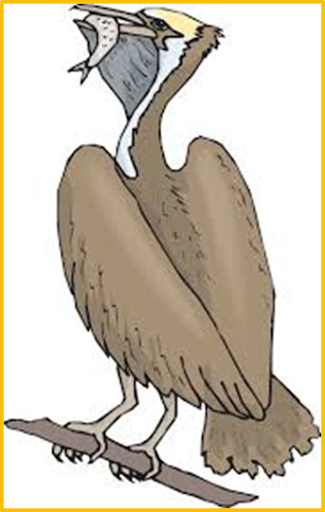
Derisively- in a manner expressing contempt or ridicule.
Plaintively- sad
Uttered- make a sound with one’s voice
Halted- stopped
Plaintively- sad
Uttered- make a sound with one’s voice
Halted- stopped
He cried in hunger to his mom while his mother screamed back angrily but he kept crying which soon turned into a joyful scream at the sight of his mother flying towards him with the piece of fish. He got excited as she came nearer and thus, leaned forward. Suddenly, she stopped not too far from him. Out of excitement and hunger, he dived at the fish without realising for a moment, that he was afraid to fly.
With a loud scream he fell outwards and downwards into space. Then a monstrous terror seized him and his heart stood still. He could hear nothing. But it only lasted a minute. The next moment he felt his wings spread outwards. The wind rushed against his breast feathers, then under his stomach, and against his wings. He could feel the tips of his wings cutting through the air. He was not falling headlong now. He was soaring gradually downwards and outwards. He was no longer afraid. He just felt a bit dizzy. Then he flapped his wings once and he soared upwards. “Ga, ga, ga, Ga, ga, ga, Gaw-col-ah,” his mother swooped past him, her wings making a loud noise. He answered her with another scream. Then his father flew over him screaming. He saw his two brothers and his sister flying around him curveting and banking and soaring and diving.
Monstrous- horrible
Seized- grab
Headlong- with the head foremost
Soaring- flying or rising high in the air
Swooped- (especially of a bird) move rapidly downwards through the air
Curvetting- perform a series of jumps on the hind legs
Headlong- with the head foremost
Soaring- flying or rising high in the air
Swooped- (especially of a bird) move rapidly downwards through the air
Curvetting- perform a series of jumps on the hind legs
He got so excited that he fell as soon as he tried. For a moment, he was in shock and stood still out of terror. All this lasted only for a moment and soon, his feathers opened as he flied. He could feel the wind against his breast feathers, stomach and his wings. He could feel himself cutting through the air. He was not afraid anymore. He was just a bit nervous but then his mother accompanied him. The whole family screamed out of excitement, thus, celebrating his victory over fear.
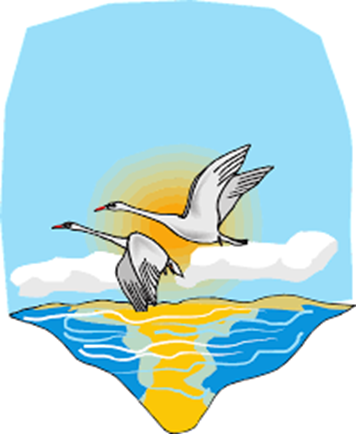
Then he completely forgot that he had not always been able to fly, and commended himself to dive and soar and curve, shrieking shrilly. He was near the sea now, flying straight over it, facing straight out over the ocean. He saw a vast green sea beneath him, with little ridges moving over it and he turned his beak sideways and cawed amusedly.
Shrieking- making a high-pitched piercing cry or sound
Shrilly- loudly and forcefully
Ridges- a long, narrow hilltop, mountain range, or watershed
Cawed- utter a caw
Shrilly- loudly and forcefully
Ridges- a long, narrow hilltop, mountain range, or watershed
Cawed- utter a caw
Once he overcame his fear, he forgot that he was once afraid of it. He did all those things he once feared. He flied straight over the sea and could see the greenery and the mountains beneath him. He screamed out of joy as he enjoyed the victory.
His parents and his brothers and sister had landed on this green flooring ahead of him. They were beckoning to him, calling shrilly. He dropped his legs to stand on the green sea. His legs sank into it. He screamed with fright and attempted to rise again flapping his wings. But he was tired and weak with hunger and he could not rise, exhausted by the strange exercise. His feet sank into the green sea, and then his belly touched it and he sank no farther. He was floating on it, and around him his family was screaming, praising him and their beaks were offering him scraps of dog-fish. He had made his first flight.
Beckoning- gesture
When he landed, his family landed along with him as a gesture that they were proud. They were screaming and shouting in excitement in their high pitched voices. He then went into the sea where at first, he got scared and thus, panicked. He tried escaping but got tired and weak because of hunger. Thus, when he calmed down, he started floating in the sea he was once afraid of. His family was celebrating in excitement and offered him food as praise. Finally, he had overcome his fear and had made his first flight.
His First Flight Questions and Answers
Q1. Why was the young seagull afraid to fly? Do you think all young birds are afraid to make their first flight, or are some birds more timid than others? Do you think a human baby also finds it a challenge to take its first steps?
A. The young seagull was afraid to fly because it was his first flight. He doubted that his wings would not be able to support him. We are well aware that “Journey to a thousand miles begins with a single step” and it is very difficult to take that first step. Thus, I think all birds must be hesitating before taking their first flight, some more than others. Yes, just like young birds, human babies also hesitate while taking their first step.
Q2. “The sight of the food maddened him.” What does this suggest? What compelled the young seagull to finally fly?
A. On not being able to gather courage to fly and acting like a coward, the young seagull’s family left him alone. As a result, he was starving since he could not fly to get his own food. When he saw his mother coming near him with fish, he got excited and dived straight at the fish, forgetting for a moment that he was afraid of flying. Thus, he got so maddened by the sight of food because he was starving, which compelled him to take his first flight.
Q3. “They were beckoning to him, calling shrilly.” Why did the seagull’s father and mother threaten him and cajole him to fly?
A. Unlike his younger siblings, the poor seagull could not gather enough courage to take his first flight. Thus, his parents taunted him for being a coward. They even threatened it to let it starve if he did not try. They thought hunger would make him fly looking for his food. They did all of this because they wanted him to fly.
EXTRA QUESTIONS- ANSWERS
Short
Answer Type Questions (30-40 words )
Question 1. What happened when the young seagull
dived at the fish picked up by his mother ?
Answer:
When the young sea
gull dived at the fish, he fell outwards and downwards with a scream. His
monstrous terror siezed him and his heart stood still. Soon his wings spread
outwards and he could feel the tips of his wings cutting through the air.
Question 2. How did the seagull feel when his belly
touched the green sea ?
Answer:
When the seagull’s
belly touched the green sea, he was scared that he would sink. He tried to fly
but could not. He was exhausted and weak due to hunger.
Question 3. Why was the young seagull afraid ?
Answer: The seagull was afraid as he was unable to fly. He felt that his legs were not strong enough.
Answer: The seagull was afraid as he was unable to fly. He felt that his legs were not strong enough.
Question 4. What did the young seagull do to attract
his mother’s attention ?
Answer:
In order to
attract his mother’s attention, the young seagull stood on one leg and
pretended to be falling asleep on the brink of the ledge.
Question 5. The young seagull was afraid of flying.
Why ?
Answer: The young seagull was afraid of flying as it was a steep fall to the sea, the sea expanse was vast and he thought that his wings would not support him.
Answer: The young seagull was afraid of flying as it was a steep fall to the sea, the sea expanse was vast and he thought that his wings would not support him.
Long Answer
Type Questions (100-120 words )
Question 1. A young seagull is too afraid to fly.
His father and mother threaten him and cajole him to fly. Don’t you think that
such type of strategy is followed by almost all parents to make their children
learn ? Substantiate your answer with examples.
Answer: The young seagull is scared to fly. He is afraid of the vast exposure of the sea beneath him. His parents cajole him to fly but he is too scared to fly. At the same time, he is desperate with hunger. He expects his parents to feed him. But he is left alone without food. They threaten him that he’ll die of hunger if he doesn’t fly. Then the mother tempts him with a fish within his reach, but not closer to him. He ultimately falls to temptation and dives into the sea and finally succeeds. All the parents should follow such type of strategy to make their children learn. They should not pamper their children by spoon feeding. They should make them independent. Parents strictness in making a child learn a skill shouldn’t be taken as a threat. It is in favour of child as without threat, the seagull won’t have learnt to fly; he would be starved to death.
Answer: The young seagull is scared to fly. He is afraid of the vast exposure of the sea beneath him. His parents cajole him to fly but he is too scared to fly. At the same time, he is desperate with hunger. He expects his parents to feed him. But he is left alone without food. They threaten him that he’ll die of hunger if he doesn’t fly. Then the mother tempts him with a fish within his reach, but not closer to him. He ultimately falls to temptation and dives into the sea and finally succeeds. All the parents should follow such type of strategy to make their children learn. They should not pamper their children by spoon feeding. They should make them independent. Parents strictness in making a child learn a skill shouldn’t be taken as a threat. It is in favour of child as without threat, the seagull won’t have learnt to fly; he would be starved to death.
Question 2. What role was played by the family of the seagull to train him
in the art of flying ?
Answer: To train the young seagull in the art of flying, the entire family helped out. His sister and brothers encouraged him to muster up courage and try to fly. The parents called out in a shrill voice, along with cajoling and scolding him in turn. Then they threatened to let him starve. When all this proved unsuccessful, his mother tempted him by flying close to his ledge with a piece of fish in its mouth. Maddened by hunger, he dived forward to get that piece and fell into space. To save himself he spread his wings and found that he was able to fly. Thus, the entire family helped him in learning the art of flying.
Answer: To train the young seagull in the art of flying, the entire family helped out. His sister and brothers encouraged him to muster up courage and try to fly. The parents called out in a shrill voice, along with cajoling and scolding him in turn. Then they threatened to let him starve. When all this proved unsuccessful, his mother tempted him by flying close to his ledge with a piece of fish in its mouth. Maddened by hunger, he dived forward to get that piece and fell into space. To save himself he spread his wings and found that he was able to fly. Thus, the entire family helped him in learning the art of flying.
Question 3. Do you think hunger was a good
motivation for the young seagull in his first flight ?
Answer: Yes, in this case, hunger was a great motivation for the young seagull. He was coward, full of fear. All the efforts of his parents had failed to coax him into flight. For 24 hours, no one went near him and he was almost faint with hunger. Finally, the mother flew near him with a scrap of food in her beak. Unable to resist, he plunged into the air to catch it and fell out. To save himself, he opened his wings, wind rushed to them and he found that he could fly.
Answer: Yes, in this case, hunger was a great motivation for the young seagull. He was coward, full of fear. All the efforts of his parents had failed to coax him into flight. For 24 hours, no one went near him and he was almost faint with hunger. Finally, the mother flew near him with a scrap of food in her beak. Unable to resist, he plunged into the air to catch it and fell out. To save himself, he opened his wings, wind rushed to them and he found that he could fly.
Question 4. All parental acts are for the betterment
of the children. Justify this statement by taking points from the lesson, ‘The
First Flight”.
Answer: The young seagull’s family tried every possible method to encourage him to fly. They cajoled him and even scolded him but to no avail. Finally, they decided to leave him hungry on the ledge for some time. Finally, his mother took a bold but seemingly cruel step. She flew close to the ledge with a scrap of fish in her beak. That made the young seagull fall from the ledge while trying to get the fish. In fright, he opened his wings and then found that he was able to fly. Thus, the purpose was served.
Answer: The young seagull’s family tried every possible method to encourage him to fly. They cajoled him and even scolded him but to no avail. Finally, they decided to leave him hungry on the ledge for some time. Finally, his mother took a bold but seemingly cruel step. She flew close to the ledge with a scrap of fish in her beak. That made the young seagull fall from the ledge while trying to get the fish. In fright, he opened his wings and then found that he was able to fly. Thus, the purpose was served.
Question 1. How did the mother make the young seagull come out of his fear and teach him the art of flying? (or)
How did the seagull family help the young seagull overcome his fear and fly? (or)
Why was the young seagull afraid of flying? What compelled the seagull to finally fly? (or)
Describe the tricks used by the seagull family to help the young seagull overcome his fear and fly.Answer: The young seagull was afraid of flying because he thought that his wings won’t support him and he would drown. When his family left him alone of the ledge, he felt alone and was very hungry. They tried hard to make him fly but he never showed the courage to try. His mother knowingly tore a piece of fish near him and flew across to him with it. She came close to him but did not go nearer. Already mad by hunger, he dived at the fish but fell into space. After sometime his wings spread outwards and he began to fly. His family landed on the sea ahead of him.They beckoned him so he landed on the sea and began to sink into water but when his belly touched the water, he floated without any fear and difficulty.
How did the seagull family help the young seagull overcome his fear and fly? (or)
Why was the young seagull afraid of flying? What compelled the seagull to finally fly? (or)
Describe the tricks used by the seagull family to help the young seagull overcome his fear and fly.Answer: The young seagull was afraid of flying because he thought that his wings won’t support him and he would drown. When his family left him alone of the ledge, he felt alone and was very hungry. They tried hard to make him fly but he never showed the courage to try. His mother knowingly tore a piece of fish near him and flew across to him with it. She came close to him but did not go nearer. Already mad by hunger, he dived at the fish but fell into space. After sometime his wings spread outwards and he began to fly. His family landed on the sea ahead of him.They beckoned him so he landed on the sea and began to sink into water but when his belly touched the water, he floated without any fear and difficulty.
Question 2. Do you think that the seagull’s family loved him? Justify their attitude towards him?Answer: The young seagull had two brothers and a sister. His parents flew with them to leave him alone on the ledge as he could not muster up the courage to fly with them. His parents could have fed him.
But, they refused to give him any food. They wanted him to fly and dive for his food. They threatened to let him starve. They did so because they loved him.
The parents were right in what they did because they wanted to teach him the importance of confidence and self-reliance. One can’t depend on their parents all his life to be fed. Thus, it was important for him to learn to fly, dive and search his own food. So, the attitude the seagull family showed to him was actually their love, care and concern for him.
But, they refused to give him any food. They wanted him to fly and dive for his food. They threatened to let him starve. They did so because they loved him.
The parents were right in what they did because they wanted to teach him the importance of confidence and self-reliance. One can’t depend on their parents all his life to be fed. Thus, it was important for him to learn to fly, dive and search his own food. So, the attitude the seagull family showed to him was actually their love, care and concern for him.
Question 3. Why was the young seagull pretending to be asleep? What did he actually observe while doing so?Answer: The young seagull came to the brink of the ledge. He stood there on one leg with the other leg hidden under his wing. He closed his one eye, then the other, and pretended to be falling asleep. He did so because he wanted to know whether they were interested in him or not but he observed that his family was not noticing him. He saw his brothers and sister lying on the plateau. They were dozing. His father was preening the feathers on his white back. Only his mother was looking at him. Now and then, she tore at a piece of fish that lay at her feet. Then she scrapped each side of the back on the rock.
Question 4. How did the young seagull get over his fear of sea water and what was his family’s reaction on it?Answer: The young seagull had made his maiden flight successfully. When he was near the sea. he was flying straight over it. He observed a vast green sea all around him. He turned his beak sideways and cawed amusedly. His family was very happy and landed ahead of him. They beckoned to him.
When he landed on the sea, he began to sink but he tried in despair and his belly touched the water and he sank no further. He was floating on water. This way he got over his fear of seawater and his family praised him a lot and offered him the dog-fish as a reward.
When he landed on the sea, he began to sink but he tried in despair and his belly touched the water and he sank no further. He was floating on water. This way he got over his fear of seawater and his family praised him a lot and offered him the dog-fish as a reward.
Question 5. Fear and lack of confidence stop one from learning new things. Do you agree? How did these two traits of the young seagull make him coward? How did he overcome these short comings?Answer: Yes, It is true that fear and lack of confidence stop one from learning new things as in the story, the young seagull lacked the value of courage and confidence in his character. He was too scared of flying. His family tried hard to make him fly but he refused to do so because of his fear of sinking in the seawater. They even scolded him for his cowardice. They tried to tempt him with food but he was not willing to learn flying. Once he dived, his fear disappeared and he enjoyed his first flight.
It is a fact that unless we try for something and overcome our fear, we can’t learn anything. Confidence and motivation are two most important traits that make any learning possible.
It is a fact that unless we try for something and overcome our fear, we can’t learn anything. Confidence and motivation are two most important traits that make any learning possible.
Two Stories about Flying
Black Aeroplane by Frederick Forsyth
(Introduction)
The lesson “Black Aeroplane” by Frederick Forsyth reflects on how one’s judgement gets distorted due to fantasizing and how it creates problems. In this chapter, the narrator is a pilot who is so eager to meet his family and have a good breakfast that he takes the wrong decision of facing the storm instead of doing the right thing. Miraculously, he somehow manages to escape with the help of a mysterious aeroplane.
Story II-The Black Aeroplane
The Narrator -A pilot who was flying his Dakota aeroplane over France back to England lost his way due to storm.
The Unknown Friend- A pilot who was flying the black aeroplane helped the narrator to find the way in the storm.
The Woman -The working woman in the control centre whom the narrator asked about the unknown friend of the black aeroplane.
The Narrator -A pilot who was flying his Dakota aeroplane over France back to England lost his way due to storm.
The Unknown Friend- A pilot who was flying the black aeroplane helped the narrator to find the way in the storm.
The Woman -The working woman in the control centre whom the narrator asked about the unknown friend of the black aeroplane.
Black Aeroplane (Summary)
The story “Black Aeroplane” is about a pilot who feels happy and contended to fly over a city that is sleeping (at the night time). He is flying from Paris to London. While taking his flight, he dreams about the long holiday with his family. He also fantasizes about the scrumptious breakfast he would have upon landing. As soon as he crosses Paris, he gets a look of the dark clouds that were a sign of the upcoming storm. The right decision would have been to turn back to Paris for the sake of safety. But he being overshadowed by his dreams and not wanting to delay them, risks the life of his passengers and heads straight into the storm. Everything gets dark, he is unable to see, all his direction instruments stopped functioning and he lost control of the plane. When all hope was lost, he saw another plane whose pilot was more than willing to rescue them. The author was panicking as there was very less amount of fuel left. The anonymous pilot guided them out of the storm and disappeared as soon as they saw light. Upon landing, when he asks the lady in the control room about the other pilot, he is left in shock when she says that his was the only plane in the sky.
Explanation of lesson
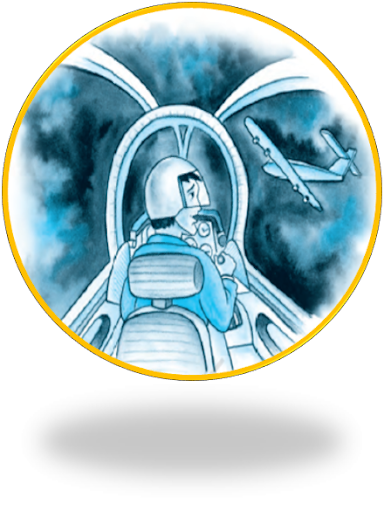
THE moon was coming up in the east, behind me, and stars were shining in the clear sky above me. There wasn’t a cloud in the sky. I was happy to be alone high up above the sleeping countryside. I was flying my old Dakota aeroplane over France back to England. I was dreaming of my holiday and looking forward to being with my family. I looked at my watch: one thirty in the morning.
It was night time when the sky was clear and the stars could be seen twinkling. The pilot felt peace in being above a country that had fallen asleep while he was flying over France to England. It was half-past one in the morning and he was fantasizing about holidaying with his family.
‘I should call Paris Control soon,’ I thought. As I looked down past the nose of the aeroplane, I saw the lights of a big city in front of me. I switched on the radio and said, “Paris Control, Dakota DS 088 here. Can you hear me? I’m on my way to England. Over.” The voice from the radio answered me immediately: “DS 088, I can hear you. You ought to turn twelve degrees west now, DS 088. Over.”
When the aeroplane was in France, the pilot thought of informing the Paris Control personnel about its presence and for instructions. At that time, lights from the Paris city were blaring at him. He informed the Control Agency to which they replied with further instruction on directions. The control room at Paris instructed him to turn 12 degrees towards the west.
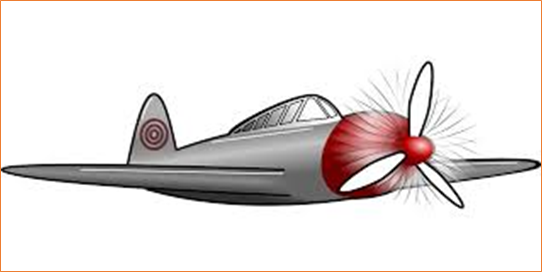
I checked the map and the compass, switched over to my second and last fuel tank, and turned the Dakota twelve degrees west towards England. ‘I’ll be in time for breakfast,’ I thought. A good big English breakfast! Everything was going well — it was an easy flight.
Compass- instrument for telling direction
After receiving the instructions, the pilot geared up and followed them while putting the last fuel tank into operation. All this time, he was dreaming about his time with his family and then, he started thinking about having a satisfactory breakfast at the destination point. He was calm as everything was going as planned.
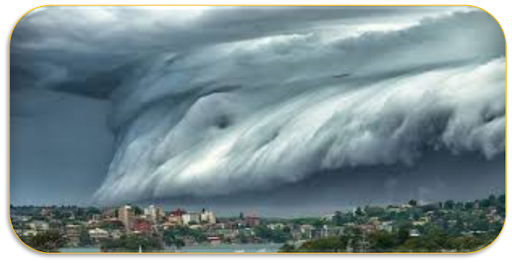
Paris was about 150 kilometres behind me when I saw the clouds. Storm clouds. They were huge. They looked like black mountains standing in front of me across the sky. I knew I could not fly up and over them, and I did not have enough fuel to fly around them to the north or south. “I ought to go back to Paris,” I thought, but I wanted to get home. I wanted that breakfast. ‘I’ll take the risk,’ I thought, and flew that old Dakota straight into the storm.
Now, the plane had crossed Paris when he started seeing clouds in the sky. The presence of clouds made it unsafe to travel by air because there were chances of a storm. They were so huge and dark that the pilot compared them with “black mountains”. He knew he couldn’t pass them as it was impossible to go above them or escape them with the amount of fuel that was left in the last tank. The right decision would have been to fly back to Paris safely. But the pilot’s decision making was clouded by his wish to meet his family. He so desperately wanted to be with his family and have that English breakfast he had been dreaming of all day, that he took the risk of not going back. Thus, he headed the plane right into the storm.
Inside the clouds, everything was suddenly black. It was impossible to see anything outside the aeroplane. The old aeroplane jumped and twisted in the air. I looked at the compass. I couldn’t believe my eyes: the compass was turning round and round and round. It was dead. It would not work! The other instruments were suddenly dead, too. I tried the radio.
It was so dark because of the storm that nothing was visible outside the plane. He started losing control of the aeroplane. The compass and other instruments had also stopped working because of the bad weather. He became helpless.
“Paris Control? Paris Control? Can you hear me?” There was no answer. The radio was dead too. I had no radio, no compass, and I could not see where I was. I was lost in the storm. Then, in the black clouds quite near me, I saw another aeroplane. It had no lights on its wings, but I could see it flying next to me through the storm. I could see the pilot’s face — turned towards me. I was very glad to see another person. He lifted one hand and waved. “Follow me,” he was saying. “Follow me.” ‘He knows that I am lost,’ I thought. ‘He’s trying to help me.’
He tried calling the Paris Control Agency who had helped him earlier but couldn’t connect because of the weather. In the midst of nowhere, when everything failed, he saw a ray of hope when he saw another aeroplane. He felt relieved when he saw another pilot’s face and willingness to help him escape the storm. He thought to himself that the other pilot is very kind as he knew that they were lost and was trying to help him.
He turned his aeroplane slowly to the north, in front of my Dakota, so that it would be easier for me to follow him. I was very happy to go behind the strange aeroplane like an obedient child. After half an hour the strange black aeroplane was still there in front of me in the clouds. Now there was only enough fuel in the old Dakota’s last tank to fly for five or ten minutes more. I was starting to feel frightened again. But then he started to go down and I followed through the storm. Suddenly I came out of the clouds and saw two long straight lines of lights in front of me. It was a runway! An airport! I was safe! I turned to look for my friend in the black aeroplane, but the sky was empty. There was nothing there. The black aeroplane was gone. I could not see it anywhere.
Runway- a strip of hard ground along which aircraft take off and land
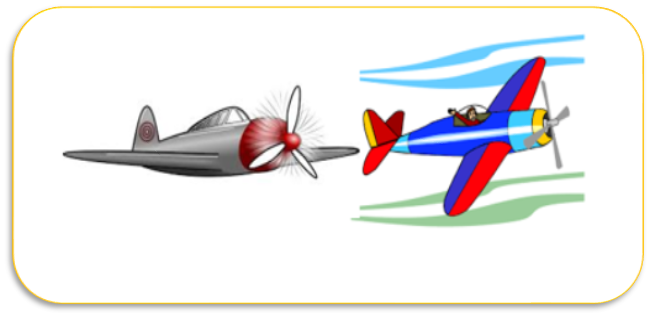
Frightened- terrified
Followed- chased
Obedient- one who obeys
Glad- happy
Followed- chased
Obedient- one who obeys
Glad- happy
The other pilot took his plane ahead of the lost aeroplane to make it easier for them to follow while the author followed him like an “obedient child”. He was also panicking because there was very less amount of fuel left. It was only then that he started coming out of the storm and could see the runway to land his plane safely. When he turned to thank the other pilot, he realised that the plane that helped him, had disappeared as soon as he came out of the storm.
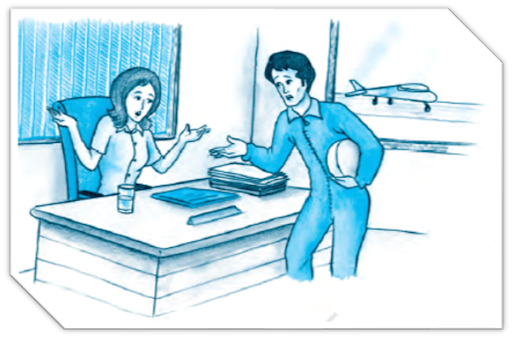
I landed and was not sorry to walk away from the old Dakota near the control tower. I went and asked a woman in the control centre where I was and who the other pilot was. I wanted to say ‘Thank you’. She looked at me very strangely, and then laughed. “Another aeroplane? Up there in this storm? No other aeroplanes were flying tonight. Yours was the only one I could see on the radar.” So who helped me to arrive there safely without a compass or a radio, and without any more fuel in my tanks? Who was the pilot on the strange black aeroplane, flying in the storm, without lights?
Radar- a system for detecting the presence, direction, distance, and speed of aircraft, ships, and other objects, by sending out pulses of radio waves which are reflected off the object back to the source
Strangely- in a strange manner
The author did not know where he had landed but was not afraid of leaving his plane unattended. He headed straight into the control room to ask about the other pilot. To his utmost surprise, the lady informed him that there was no other plane in the sky except his because of the bad weather. He is left astonished with a lot of questions unanswered in his mind.
Questions and Answers
Q1. “I’ll take the risk.” What is the risk? Why does the narrator take it?
A. The “risk” here refers to not doing the right thing, which is flying back to Paris when he came to know about the storm. Despite being aware of the bad weather, the pilot headed straight into the storm and risked the lives of his fellow passengers. The pilot’s decision making was clouded by his wish to meet his family. He so desperately wanted to be with his family and have that English breakfast he had been dreaming of all day, that he took the risk of not going back.
Q2. Describe the narrator’s experience as he flew the aeroplane into the storm.
A. The narrator was frightened as he lost control of the plane. He felt helpless as the compass and other instruments had stopped working. Nothing outside the aeroplane was visible when suddenly in the midst of nowhere, an unknown plane was visible and the pilot was eager to help him. The narrator was panicking because there was very less fuel left but somehow, he managed to escape the storm with the help of the strange pilot who he could not thank.
Q3. Why does the narrator say, “I landed and was not sorry to walk away from the old Dakota…”?
A. The narrator had landed at an unknown place as his compass and radar had stopped functioning in the storm. He was not scared to leave the plane unattended and go to the control centre to inquire about the mysterious plane which had helped him out of the storm.
Q4. What made the woman in the control centre look at the narrator strangely?
A. The woman in the control centre looked at the narrator strangely when he asked about the other pilot that helped him escape the storm. This is because there was no other plane in the sky during such bad weather.
Q5. Who do you think helped the narrator to reach safely? Discuss this among yourselves and give reasons for your answer.
A. It was the pilot’s own conscience which helped him out of the storm. There was no other plane out on that stormy night. So, probably, he was hallucianting. It was his own capability as a pilot which led him out of that black cloud.
Black Aeroplane Grammar Exercise
Now, try to guess the meanings of the word ‘black’ in the sentences given below. Check the meanings in the dictionary and find out whether you have guessed right.
1. Go and have a bath; your hands and face are absolutely black. ________
2. The taxi-driver gave Ratan a black look as he crossed the road when the traffic light was green. ___________
3. The bombardment of Hiroshima is one of the blackest crimes against humanity. __________
4. Very few people enjoy Harold Pinter’s black comedy. ____________
5. Sometimes shopkeepers store essential goods to create false scarcity and then sell these in black. ___________
6. Villagers had beaten the criminal black and blue. _______________
1. Go and have a bath; your hands and face are absolutely black. ________
2. The taxi-driver gave Ratan a black look as he crossed the road when the traffic light was green. ___________
3. The bombardment of Hiroshima is one of the blackest crimes against humanity. __________
4. Very few people enjoy Harold Pinter’s black comedy. ____________
5. Sometimes shopkeepers store essential goods to create false scarcity and then sell these in black. ___________
6. Villagers had beaten the criminal black and blue. _______________
Answers-
1. Go and have a bath; your hands and face are absolutely black.
The meaning of ‘black’ in this sentence is that the face and hands are dark with dust and heat.
2. The taxi-driver gave Ratan a black look as he crossed the road when the traffic light was green.
Here, ‘black’ refers to an angry look.
3. The bombardment of Hiroshima is one of the blackest crimes against humanity.
Here, ‘blackest’ refers to the darkest and cruellest crime against humanity.
4. Very few people enjoy Harold Pinter’s black comedy
Here, ‘black’ refers to dark and gloomy comedy.
5. Sometimes shopkeepers store essential goods to create false scarcity and then sell these in black.
The meaning of ‘black’ in this sentence is that the shopkeepers sell the described goods ‘at a higher price’.
6. Villagers had beaten the criminal black and blue.
Here, ‘black’ means that the criminal suffered excessive beating at the hands of the villagers.
Match the phrases given under Column A with their meanings given under Column B:
| A |
B
|
|
|
Answers-
| A |
B
|
|
|
We know that the word ‘fly’ (of birds/insects) means to move through air using wings. Tick the words which have the same or nearly the same meaning.
| swoop |
flit
|
Paddle
|
Flutter
|
ascend
|
float
|
ride
|
Skim
|
Sink
|
Dart
|
Hover
|
Glide
|
Descend
|
Soar
|
Shoot
|
Spring
|
Stay
|
Fall
|
Sail
|
Flap
|
Answers-
| Swoop |
flit
|
Paddle
|
Flutter
|
ascend
|
Float
|
ride
|
Skim
|
Sink
|
Dart
|
Hover
|
Glide
|
Descend
|
Soar
|
Shoot
|
Spring
|
Stay
|
Fall
|
Sail
|
Flap
|
EXTRA QUESTIONS- ANSWERS
Short
Answer Type Questions (30-40 words)
Question 1. Describe the sky when ‘Dakota’ took off
from Paris.
Answer: When ‘Dakota’ took off from Paris, the sky was quite clear. The moon was coming up in the east and the stars were shining. There were no clouds in the sty
Answer: When ‘Dakota’ took off from Paris, the sky was quite clear. The moon was coming up in the east and the stars were shining. There were no clouds in the sty
Question 2. ‘I’ll take the risk ? What is the risk ?
Why does the pilot of the old Dakota take it ?
Answer:
The risk was of
flying the old Dakota airplane into the storm. The pilot took it as he^ wished
to reach home as soon as possible and to be present at the breakfast table.
Question 3. What difficulties did the narrator face
while flying in the storm ?
Answer: The difficulties that the narrator faced were that all the instruments of his aeroplane were stopped working. He could not see any thing as there were dark clouds all around.
Answer: The difficulties that the narrator faced were that all the instruments of his aeroplane were stopped working. He could not see any thing as there were dark clouds all around.
Question 4. A pilot is lost in the storm clouds.
Does he arrive safe ? Who helps him ?
Answer: Yes, the pilot arrives safe on the runway. He is helped by another pilot of a mysterious plane. He vanishes soon after the narrator landed on the airport.
Answer: Yes, the pilot arrives safe on the runway. He is helped by another pilot of a mysterious plane. He vanishes soon after the narrator landed on the airport.
Question 5. What shocked the narrator after landing
safely ?
Answer:
The narrator was
shocked to land safely after struggling against the black storm. Besides, he
wanted to thank the other pilot who showed him the way, but he too was seen nowhere.
Long Answer
Type Questions (100-120 words)
Question 1. From the beginning to the end of the
lesson the black aeroplane is a mystery. How ?
Answer: The narrator started his journey with old Dakota – 088. At that time, the sty was clear. But suddenly, he found himself in the midest of black clouds. There was zero visibility, everything was black. He couldn’t find any way to escape. All of a sudden, the narrator saw a black aeroplane and was helped by the other pilot. He safely landed at the airport but no one saw the black aeroplane. It remains a mystery till the end.
Answer: The narrator started his journey with old Dakota – 088. At that time, the sty was clear. But suddenly, he found himself in the midest of black clouds. There was zero visibility, everything was black. He couldn’t find any way to escape. All of a sudden, the narrator saw a black aeroplane and was helped by the other pilot. He safely landed at the airport but no one saw the black aeroplane. It remains a mystery till the end.
Question 2. Describe the narrator’s experience as he
flew the aeroplane into the storm. Throw a light on his feelings and emotions
at that time.
Answer: The narrator was in a hurry to reach England although he had little fuel. He felt home sick and missed his home. So, he took the risk to fly on low fuel. Suddenly, he lost contact with Paris due to cloudy storm. Just then a black aeroplane appeared. He was helped by the mysterious pilot and was able to land safely.
Answer: The narrator was in a hurry to reach England although he had little fuel. He felt home sick and missed his home. So, he took the risk to fly on low fuel. Suddenly, he lost contact with Paris due to cloudy storm. Just then a black aeroplane appeared. He was helped by the mysterious pilot and was able to land safely.
Question 3. How did the author come out safely from
the black clouds ?
Answer: The author took the risk of flying through the black clouds. He couldn’t see anything. The aeroplane jumped and twisted up every now and then. All his instruments had stopped working. Suddenly, he saw another plane with no lights on its wings. The other pilot gestured him to follow his plane and guided him till they had landed safely out of the clouds.
Answer: The author took the risk of flying through the black clouds. He couldn’t see anything. The aeroplane jumped and twisted up every now and then. All his instruments had stopped working. Suddenly, he saw another plane with no lights on its wings. The other pilot gestured him to follow his plane and guided him till they had landed safely out of the clouds.
Story II The Black Aeroplane
Question 1. How did the writer get out of the storm
in the night to land safely? [CBSE
2016]
Answer: The writer was flying his old Dakota aeroplane when he saw the black clouds. He was lost in the storm. Suddenly, he saw a black aeroplane by his side, which had no lights, on its wings.
The pilot instructed the writer to follow as he had lost the way. He obeyed him like a child. He was very happy to follow him. After some time the pilot of another plane started to land. The writer followed him blindly through the storm and came out of the clouds. He saw the lights of the runway and landed safely.
Answer: The writer was flying his old Dakota aeroplane when he saw the black clouds. He was lost in the storm. Suddenly, he saw a black aeroplane by his side, which had no lights, on its wings.
The pilot instructed the writer to follow as he had lost the way. He obeyed him like a child. He was very happy to follow him. After some time the pilot of another plane started to land. The writer followed him blindly through the storm and came out of the clouds. He saw the lights of the runway and landed safely.
Question 2. Why was the writer happy when he decided
to fly in the night?
Answer: The writer was very happy when he decided to fly that night because he was going home to his family to enjoy his holiday. When he started, everything seemed to be perfect. The sky was clear, no clouds could be seen and the stars were shining. It all made it an easy task for the writer to fly that night over the sleeping countryside of Paris. His assumption of everything being in place made him happy.
Answer: The writer was very happy when he decided to fly that night because he was going home to his family to enjoy his holiday. When he started, everything seemed to be perfect. The sky was clear, no clouds could be seen and the stars were shining. It all made it an easy task for the writer to fly that night over the sleeping countryside of Paris. His assumption of everything being in place made him happy.
Question 3. The pilot wanted to thank another pilot
after his safe landing. Why? What values of the writer are reflected from his
action?
Answer: The pilot (writer) of the old Dakota was caught in the storm. He lost his contact with the control room. In this troubling situation, his fuel tank was also empty. He lost all his hopes but suddenly a black strange plane appeared. The pilot of the black place asked writer to follow him. The writer landed safely. After his safe landing, he wanted to thank the pilot of the black plane. This shows his gratitude towards the pilot of the Black Plane. He was thankful to him for saving his life. It shows that the pilot of Dakota had a value of gratefulness in his character.
Answer: The pilot (writer) of the old Dakota was caught in the storm. He lost his contact with the control room. In this troubling situation, his fuel tank was also empty. He lost all his hopes but suddenly a black strange plane appeared. The pilot of the black place asked writer to follow him. The writer landed safely. After his safe landing, he wanted to thank the pilot of the black plane. This shows his gratitude towards the pilot of the Black Plane. He was thankful to him for saving his life. It shows that the pilot of Dakota had a value of gratefulness in his character.

Comments
Post a Comment